41112 Sunrday LESSON 741 -Dhammapada Verse Verse 5: இப்பூவுலகில் வெருப்பை வெருப்பால் வெற்றி கொள்ள முடியாது. அன்பே வெருப்பை வெல்லும்.இதுவே வழிவந்த தம்மமாகும் -Hatred is, indeed, never appeased by hatred in this world.
It is appeased only by loving-kindness. This is an ancient law. described as eternal wisdom..406 Samaneranam
Vatthu-Him I call a brahmana, who is not
hostile to those who are hostile, who is peaceful (i.e., has laid aside the use
of force) to those with weapons, and who is without attachment to objects of
attachment.திரிபிடகம் மூன்று தொகுப்புகள் ![]() TIPITAKA- from FREE ONLINE eNālāndā Research and
TIPITAKA- from FREE ONLINE eNālāndā Research and
Practice UNIVERSITY through http://sarvajan.ambedkar.org
இப்பூவுலகில் வெருப்பை வெருப்பால் வெற்றி கொள்ள முடியாது. அன்பே வெருப்பை வெல்லும்.இதுவே வழிவந்த தம்மமாகும்.
நஹி வெரேன வெரானீ -
ஸம்மன் தீத குதாசனங்
அவேரென ச ஸம்மந்தீ -
ஏ ஸ தம்மோ ஸனந்தனோ
கலயக்கினியின் கதை
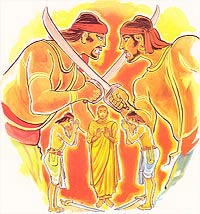
Verse 5. Hatred is Overcome Only by Non-hatred
Never here by enmity
are those with enmity allayed,
they are allayed by amity,
this is the timeless Truth.
Explanation: Those who attempt to conquer hatred by hatred
are like warriors who take weapons to overcome others who bear arms.
This does not end hatred, but gives it room to grow. But, ancient
wisdom has advocated a different timeless strategy to overcome hatred.
This eternal wisdom is to meet hatred with non-hatred. The method
is of overcoming hatred through non-hatred is eternally effective.
That is why that method is described as eternal wisdom.
Dhammapada Verse 5
Kalayakkhini Vatthu
Na hi verena verani
sammantidha kudacanam
averena ca sammanti
esa dhammo sanantano.
1
Verse 5: Hatred is, indeed, never appeased by hatred in this world. It is
appeased only by loving-kindness. This is an ancient law.
1. esa dhammo sanantano: This is the same as “poranako dhammo,”
the doctrine followed by the Budhha and his disciples. The exhortation is not to
return hatred for hatred but to conquer it by loving-kindness (absence of
hatred).
The Story of Kalayakkhini
While residing at the Jetavana monastery in Savatthi, the Buddha uttered
Verse (5) of this book, with reference to a certain woman who was barren, and
her rival.
Once there lived a householder, whose wife was barren; later he took another
wife. The feud started when the elder wife caused abortion of the other one, who
eventually died in child birth. In later existences the two were reborn as a hen
and a cat; a doe and a leopardess; and finally as the daughter of a nobleman in
Savatthi and an ogress named Kali. The ogress (Kalayakkhini) was in hot pursuit
of the lady with the baby, when the latter learned that the Buddha was nearby,
giving a religious discourse at the Jetavana monastery. She fled to him and
placed her son at his feet for protection. The ogress was stopped at the door by
the guardian spirit of the monastery and was refused admission. She was later
called in and both the lady and the ogress were reprimanded by the Buddha. The
Buddha told them about their past feuds as rival wives of a common husband, as a
cat and a hen, and as a doe and a leopardess. They were made to see that hatred
could only cause more hatred, and that it could only cease through friendship,
understanding and goodwill.
Then the Buddha spoke in verse as follows:
| Verse 5: Hatred is, indeed, never appeased by hatred in this world. It is appeased only by loving-kindness. This is an ancient law. |
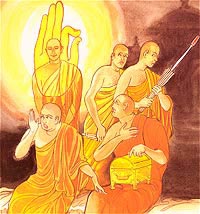
Verse 406. A Brahmana Is He Who Is Friendly Amongst The Hostile
Among the hostile, friendly,
among the violent, cool
detached amidst the passionate,
that one I call a Brahmin True.
Explanation: Being friendly even among the hostile. Free from
hostility, violence and passionate grasping, one emerges a true brahmin.
Dhammapada Verse 406
Samaneranam
Vatthu
Aviruddham viruddhesu
attadandesu nibbutam
sadanesu anadanam
tamaham brumi brahmanam.
Verse 406: Him I call a brahmana, who is not
hostile to those who are hostile, who is peaceful (i.e., has laid aside the use
of force) to those with weapons, and who is without attachment to objects of
attachment.
The Story of Four Samaneras
While residing at the Jetavana
monastery, the Buddha uttered Verse (406) of this book, with reference to four
samaneras who were arahats.
Once, the wife of a brahmin sent
her husband the brahmin to the Jetavana monastery to invite four bhikkhus to an
alms-meal at their house. She told him to specifically request for senior
bhikkhus who were also true brahmanas. But four seven year old arahat samaneras,
viz., Samkicca, Pandita, Sopaka and Revata were sent along with him. When his
wife saw the young samaneras she was very much dissatisfied and blamed the
brahmin for bringing such young samaneras who were even younger than her
grandson. She was, in fact, furious with her husband, and so she sent him back
to the monastery to get older bhikkhus. In the meantime she refused to give the
young samaneras the higher seats reserved for the bhikkhus; they were given
lower seats and she did not offer them alms-food.
When the brahmin arrived at the
monastery, he met the Venerable Sariputta and invited him to his house. When the
Venerable Sariputta arrived at the house of the brahmin, he saw the four young
arahat samaneras and asked them if they had been offered alms-food yet. On
learning that the arahat samaneras had not been given alms-food yet and also
that food had been prepared only for four persons the Venerable Sariputta
returned to the monastery without accepting alms-food from the house of the
brahmin. So his wife sent the brahmin back again to the monastery to get another
senior bhikkhu. This time, the Venerable Maha Moggallana came along with the
brahmin, but he also returned to the monastery without accepting alms-food when
he learned that the young samaneras had not been offered alms-food and also that
food had been prepared only for four persons.
By this time, the samaneras were
feeling hungry. Sakka, king of the devas, seeing the state of things took the
form of an old brahmin and came to the house. The brahmin and his wife paid
respect to the old brahmin and offered him a seat of honour, but Sakka just sat
on the ground and paid respect to the four samaneras. Then he revealed that he
was Sakka. Seeing that Sakka himself was paying respect to the young samaneras,
the brahmin couple offered alms-food to all the five. After the meal, Sakka and
the samaneras manifested their supernormal power by going right up into the sky
through the roof. Sakka went back to his celestial abode, the samaneras returned
to the monastery.
When other bhikkhus asked the
samaneras whether they did net get angry when the brahmin couple refused to
offer alms-food to them, they answered in the negative. The bhikkhus not
believing them reported to the Buddha that the four young samaneras were falsely
claiming to be arahats. To them the Buddha said, “Bhikkhus, arahats bear
no ill will towards those who are hostile to them.”
Then the Buddha spoke in verse as
follows:
| Verse 406: Him I call a brahmana, who is not hostile to those who are hostile, who is peaceful (i.e., has laid aside the use of force) to those with weapons, and who is without attachment to objects of attachment. |
31112 Saturday LESSON 740 -3) அவன் என்னை இகழ்ந்து
பேசினான். அடித்தான், என்னை தோற்கடித்தான். என் பொருள் கவர்ந்தான். என
மனதில் பகைமை வளர்த்தால் என்றுமே பகைமை தணியாது.
4) அவன் என்னை இகழ்ந்து
பேசினான். அடித்தான், என்னை தோற்கடித்தான். என் பொருள் கவர்ந்தான். என
மனதில் பகைமை வளர்க்காமல் இருக்கிறாரோ அவர் பகைமை தணியும்-Verse 404: Him I call a brahmana, who
associates not with the householder or with the homeless one, or with
both, who is free from sensual desire and has few wants.Verse 405: Him I call a brahmana, who has
laid aside the use of force towards all beings, the perturbed as well as
the unperturbed (i.e., arahats), and who does not kill or cause others
to kill.திரிபிடகம் மூன்று தொகுப்புகள் ![]() TIPITAKA- from FREE ONLINE eNālāndā Research and
TIPITAKA- from FREE ONLINE eNālāndā Research and
Practice UNIVERSITY through http://sarvajan.ambedkar.org
அக்கொச்சி மங் அவதிமங்
அஜினிமங் அஹாஸிமே
யேதங் உபனய்ஹந்தி -
வேரங் தேஸங்ன ஸம்மதி
Verse 3. Uncontrolled Hatred Leads to Harm
Who bears within them enmity:
”He has abused and beaten me,
defeated me and plundered me”,
hate is not allayed for them.
Verse 3: “He abused me, he ill-treated me, he got the better of me, he stole my belongings;”… the enmity of those harbouring such thoughts cannot be appeased.
அக்கொச்சி மங் அவதிமங்
அஜினிமங் அஹாஸிமே
யே தங்ன உபனய்ஹந்தி -
வேரங் தேஸஜீபஸம்மதி
Verse 4. Overcoming Anger
Who bears within no enmity:
”He has abused and beaten me,
defeated me and plundered me”,
hate is quite allayed for them.
Verse 4: “He abused me, he ill-treated me, he got the better of me, he stole my belongings;”… the enmity of those not harbouring such thoughts can be appeased.Dhammapada Verse 404
Pabbharavasitissatthera Vatthu
அஸங்ஸட்டங் கஹட்டெஹி -
அனாகாரெஹி சூபயங்
அனொகஸாரிங் மப்பிச்சங் -
தமஹங் ப்ரூமி பிராஹ்மணங்.
இல்லறத்தாரோடும், துறவிகளோடும் கலக்காமல், ஆசைகளை குறைத்துக் கொண்ட தேவைகளில் பற்றுத்லை ஏற்படுத்திக் கொள்ளாதவரையே நான் பிராமணர் என அழைப்பேன்.
 |
Verse 3. Uncontrolled Hatred Leads to Harm
Explanation: When a person holds that he was insulted, assaulted, |
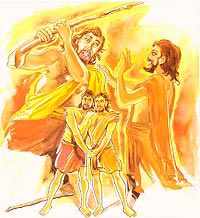 |
Verse 4. Overcoming Anger
Explanation: Living in human society, people often quarrel |
Verse 404: Him I call a brahmana, who associates not with the householder or with the homeless one, or with both, who is free from sensual desire and has few wants.
The Story of Thera Tissa
While residing at the Jetavana monastery, the Buddha uttered Verse (404) of this book with reference to Thera Tissa.
Thera Tissa, after taking a subject of meditation from the Buddha, went to a mountain side. There, he found a cave which suited him and he decided to spend the three months of the rainy season (vassa) in that cave. So he stayed in the cave and went to the village for alms-food every morning. In the village, there was a certain elderly woman who regularly offered him alms-food. In the cave, there also lived the guardian spirit of the cave. As the thera was one whose practice of morality was pure, the cave-spirit dared not live in the same cave with the noble thera; at the same time, he did not have the courage to ask the thera to leave the place. So he thought of a plan that would enable him to find fault with the thera and thus cause him to leave the cave.
The cave-spirit possessed the son of the elderly woman from the house where the thera usually went for his alms-food. He caused the boy to behave in a very peculiar way, turning his head backwards, and rolling his wide open eyes. His mother got alarmed and was in tears. The cave-spirit, who possessed the boy, then said “Let your teacher, the thera, wash his feet with water and pour that water on the head of your son.” The next day when the thera came to her house for alms-food, she did as she was advised by the cave-spirit and the boy was left in peace. The cave-spirit went back to the cave and waited at the entrance for the return of the thera. When the thera returned from his alms-round, the cave-spirit revealed himself and said, “I am the spirit guarding this cave. O you physician, do not enter this cave.” The thera knew that he had lived a clean life from the day he had become a thera, so he replied that he did not remember practising medicine. Then the cave-spirit accused him that in that very morning he had cured a young boy possessed by an ogre at the house of the elderly woman. But the thera reflected that it was not, in fact, practising medicine and he realized that even the cave spirit could find no other fault with him. That gave him a delightful satisfaction (piti) with himself, and abandoning piti and concentrating hard on Insight Meditation he attained arahatship then and there, while still standing at the entrance to the cave.
As the thera had now become an arahat, he advised the cave-spirit to leave the cave. The thera continued to stay there till the end of the vassa, and then he returned to the Buddha. When he told the other bhikkhus about his encounter with the cave-spirit, they asked him whether he did not get angry with the cave-spirit when he was forbidden to enter the cave. The thera answered in the negative but they did not believe him. So they went to the Buddha and said, “Thera Tissa claims himself to be an arahat ; he is not speaking the truth.” To them the Buddha replied, “Bhikkhus, my son Tissa was speaking the truth when he said he did not get angry. He has indeed become an arahat he is no longer attached to anyone; he has no occasion to get angry with anyone nor any need to associate with others.”
Then the Buddha spoke in verse as follows:
Dhammapada Verse 405
Annatarabhikkhu Vatthu
நிதாய தண்டங் பூ தெஸஜீ
தஸெஸஜீ தாவரெஸஜீ ச
யொ ந ஹந்தி ந காதெதி -
தமஹங் ப்ரூமி பிராஹ்மணங்
எவர் அச்சமூட்டும், அச்சம் ஊட்டாத உயிரினங்களை வதைப்பதை நிறுத்தி, பிராணிகளை கொலை செய்வதையும் கொலை செய்விப்பதையும் கைவிடுகிறாரோ அவரையே பிராமணன் என அழைப்பேன்.
Nidhaya dandati bhutesu1
tasesu thavaresu2 ca
yo na hanti na ghateti
tamaham brumi brahmanam.
Verse 405: Him I call a brahmana, who has laid aside the use of force towards all beings, the perturbed as well as the unperturbed (i.e., arahats), and who does not kill or cause others to kill.
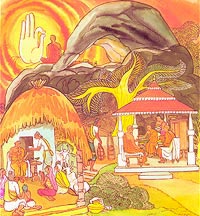 |
Verse 404. A Brahmana Is He Who Has No Intimacy With Any
Explanation: He does not establish extensive contact either |
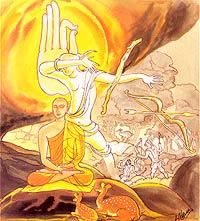 |
Verse 405. A Brahmana Is He Who Is Absolutely Harmless
Explanation: He has discarded the rod and set aside the weapons. |